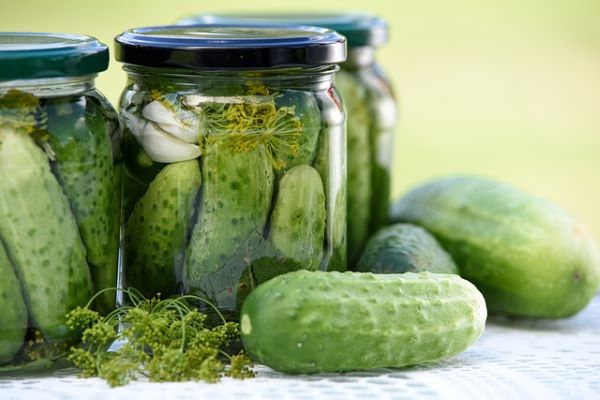Preservatives are essential in the food industry, ensuring the safety and longevity of processed foods by inhibiting microbial growth and preventing spoilage. Potassium Benzoate (E212) is a natural preservative commonly used in the food industry for its antimicrobial properties and ability to extend the shelf life of various food products. Despite its natural origin, questions have been raised regarding its safety and potential health effects. This article aims to provide a comprehensive understanding of Potassium Benzoate, including its definition, sources, applications, associated risks, regulatory status, and strategies for minimizing exposure. (Source)
What is the Food Preservative Potassium Benzoate E212?
Potassium Benzoate (E212) is the potassium salt of benzoic acid, a naturally occurring compound found in various fruits, such as berries and apples. It is produced by reacting benzoic acid with potassium hydroxide, resulting in a white, crystalline powder or granules. Potassium Benzoate is widely used as a preservative in the food industry due to its ability to inhibit the growth of bacteria, yeast, and molds, thereby preventing spoilage and maintaining the quality of processed foods. (Source)
What are the Sources of Potassium Benzoate E212:
Potassium Benzoate is derived from benzoic acid, which occurs naturally in certain fruits and their juices. However, the majority of Potassium Benzoate used in the food industry is produced synthetically through chemical processes. It is commercially available as a food additive and is commonly used in various processed foods and beverages.
What is the List of Foods Containing Potassium Benzoate E212:
Potassium Benzoate (E212) is commonly used as a preservative in a wide range of processed foods and beverages, including:
- Carbonated soft drinks and fruit-flavored beverages
- Fruit juices and concentrates
- Salad dressings and condiments
- Jams, jellies, and fruit preserves
- Syrups and sauces
- Pickles and relishes
- Baked goods, such as bread and pastries
These products often undergo microbial fermentation or are susceptible to spoilage due to their high moisture content, making Potassium Benzoate an effective preservative to maintain product stability and safety.
Why is Food Preservative– Potassium Benzoate E212 Used in the Food Industry? What are the Applications
Potassium Benzoate (E212) serves several functions in the food industry, including:
- Preservation: Potassium Benzoate inhibits the growth of bacteria, yeast, and molds by disrupting their cellular function and metabolic processes, thereby extending the shelf life of processed foods and beverages.
- pH Control: Potassium Benzoate is effective in acidic environments, making it suitable for preserving acidic foods and beverages, such as fruit juices and carbonated soft drinks.
- Flavor Protection: By preventing microbial spoilage, Potassium Benzoate helps preserve the flavor, color, and texture of processed foods and beverages, ensuring their quality and palatability over time.
The Dangers and Harmful side effects of Potassium Benzoate E212 on Human Health are:
While Potassium Benzoate is generally recognized as safe (GRAS) by regulatory agencies when consumed within recommended levels, excessive intake or prolonged exposure to high levels of Potassium Benzoate may pose certain health risks, including:
- Allergic Reactions: Some individuals may experience allergic reactions or sensitivities to Potassium Benzoate, manifesting as skin rashes, itching, hives, or respiratory symptoms, particularly in sensitive individuals.
- Metabolic Effects: Excessive consumption of Potassium Benzoate may disrupt metabolic processes and contribute to adverse health effects, including metabolic syndrome, insulin resistance, and weight gain, particularly when combined with a high-sugar diet.
- Carcinogenic Concerns: Although Potassium Benzoate itself is not considered carcinogenic, some studies suggest that it may form benzene, a potential carcinogen, when combined with ascorbic acid (vitamin C) in acidic beverages, such as soft drinks, under certain conditions.
What are the FDA regulations for food preservatives– Potassium Benzoate E212?
The U.S. Food and Drug Administration (FDA) regulates the use of Potassium Benzoate (E212) as a food additive and sets strict guidelines for its use in processed foods and beverages. The FDA permits the use of Potassium Benzoate in specific concentrations deemed safe for human consumption to ensure its effectiveness as a preservative while minimizing potential health risks. (Source)
How to Minimize the Exposure to Food Preservative– Potassium Benzoate E212?
To minimize potential risks associated with Potassium Benzoate (E212) consumption, consider the following recommendations:
- Moderation: Consume foods and beverages containing Potassium Benzoate in moderation as part of a balanced diet, and choose natural or minimally processed alternatives whenever possible.
- Read Labels: Check food labels carefully for the presence of Potassium Benzoate or its derivatives, particularly in processed foods and beverages, and choose products with lower levels of added preservatives.
- Individual Sensitivities: Be aware of individual sensitivities or allergies to Potassium Benzoate, and consult a healthcare professional if you experience adverse reactions after consuming foods containing this additive.
In conclusion, Potassium Benzoate (E212) is a natural preservative commonly used in the food industry to inhibit microbial growth and prevent spoilage in processed foods and beverages. While it is generally considered safe for consumption, concerns remain about its potential health effects, particularly with excessive intake. By understanding its sources, applications, associated risks, and regulatory considerations, consumers can make informed choices to promote their health and well-being.

Also, read: All You Need to Know about Natural Preservative Acesulfame Potassium E950
Sources and References:
- U.S. Food and Drug Administration (FDA)
- European Food Safety Authority (EFSA)
- National Institutes of Health (NIH)
- World Health Organization (WHO)
- Food and Agriculture Organization of the United Nations (FAO)
- Scientific journals and peer-reviewed research articles.





